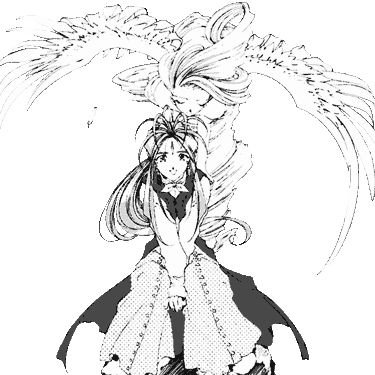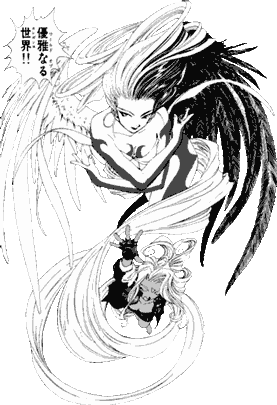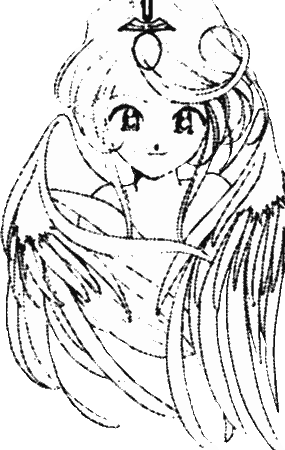 |
 |
 |
 |
 |
Dans les OVA de OMG (animés), il y a quelques notes intéressantes des traducteurs que je vais reproduire ici. Elles sont probablement écrites par Shin Kurokawa et Nishiyama Mariko. Nous les avons traduites en français de l'anglais.
À propos du nom de la série: "Oh My Goddess!" est basé sur la série Manga "Aaa! Megamisamaa", écrite par Fujishima Kousuke. "Megamisama" est le mot japonais pour "déesse" (dans le cas présent avec une voyelle finale étendue pour ajouter un emphase émotionnel) et "Aaa" est une expression qui se traduit habituellement en "Oh!" ou "Ah!". Quand le design graphique du logo japonais "Aaa! Megamisamaa" a été fait, une version en anglais du nom a été ajouté. La traduction utilisée alors était "Ah! My Goddess". Le jeu de mot avec "Oh My God!" n'a été remarqué que plus tard par M. Fujishima.
Lors de la conception de la version anglaise de l'Animé et du Manga, M. Fujishima a été consulté pour savoir ses préférences entre autres pour les noms de personnages et il a émis le voeu que la série soit appellée "Oh My Goddess!"
À propos des déesses: Les trois déesses de l'Animé sont basées sur la mythologie nordique Norm. Les déesses originelles sont Verthandi (peut être écrit Verthande), Urd (ou Urthr) et Skuld, qui sont les déesses du destin. Chacune possède son propre domaine du temps; Urd le passé, Verthandi le présent et Skuld le futur. Les déesses de "Oh My Goddess!" ont les mêmes domaines, comme on peut le voir dans leur choix de balai dans le générique d'ouverture.
Dans la série Manga originale, le nom de Verthandi est transformé en un "Berudandi" plus facilement prononçable. En effêt, il n'y a pas de son "Ve" ni "Th" en japonais. Une version en romanji (alphabet roman) a été requise dès le début et "Berudandi" est devenu "Belldandy" quand épellé en anglais. Nous pensons que c'est un joli nom pour une déesse.
 |
 |
 |
In the OMG! OVAs (animes), there are a couple interresting "Translator's Notes" that I will reproduce here. They are probably written by Shin Kurokawa and Nishiyama Mariko.
About the Series Name: "Oh My Goddess!" is based on the manga series "Aaa! Megamisamaa," written by Fujishima Kousuke. "Megamisama" means "goddess," (in this case, with an extended ending vowel to add emotional emphasis) and "Aaa" is an expression that usually translates to "Oh!" or "Ah!". When the graphic design of the Japanese "Aaa! Megamisamaa" logo was being done, an English version of the series name was added for spice; the translation used was "Ah! My Goddess." At the time, the possible English play on "Oh My God!" wasn't noticed, but was subsequently pointed out by Mr. Fujishima.
When it came time to do the English version of the Anime and the Manga, Mr. Fujishima was consulted regarding his preferences concerning character names and other matters, and he expressed a desire that the translated series be called "Oh My Goddess!"
About the Goddesses: All three goddesses are based on the Norms from Nordic mythology. The original goddesses were Verthandi (optional spelling: Verthande), Urd (optional spelling: Urthr) and Skuld, who were the goddesses of fate. Each of these goddesses had their own domain in time. Urd the past, Verthandi the present and Skuld the future; the goddesses of "Oh My Goddess!" have the same domains, as you can see by noting their choice of broomsticks in the opening credits.
In the original manga series, Verthandi mutated into the more easily pronounceable "Berudandi." This happened because there are no "Ve" and "th" sounds in Japanese. Then, somewhere along the line, a romaji (roman alphabet) version of the name was needed, one that could still be read by a Japanese reader, and "Berudandi" became "Belldandy" when spelt in English. We think it is a fine name for a goddess.
Standardized URL: http://geocities.datacellar.net/Tokyo/Shrine/7919/amg/